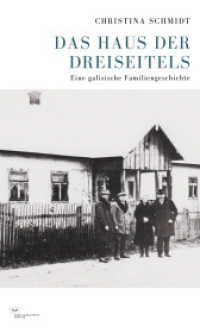- ホーム
- > 洋書
- > ドイツ書
- > Humanities, Arts & Music
- > Linguistics
Full Description
This book explores how two early modern and two modern Japanese writers - Yosa Buson (1716-83), Ema Saikō (1787-1861), Masaoka Shiki (1867-1902), and Natsume Sōseki (1867-1916) - experimented with the poetic artifice afforded by the East Asian literati (bunjin) tradition, a repertoire of Chinese and Japanese poetry and painting. Their experiments generated a poetics of irony that transformed the lineaments of lyric expression in literati culture and advanced the emergence of modern prose poetry in Japanese literature. Through rigorous close readings, this study changes our understanding of the relationship between lyric form and the representation of self, sense, and feeling in Japanese poetic writing from the late eighteenth through the early twentieth century. The book aims to reach a broad audience, including specialists in East Asian Studies, Anglophone literary studies, and Comparative Literature.
Contents
Chapter One: "Yosa Buson and the Colors of the Literati Mind"Chapter Two: "Sense and Sensibility in the Poetry of Ema Saikō"
Chapter Three: "Representing Life in the Prose Poems of Masaoka Shiki"
Chapter Four: "Grief and Grieving in the Prose Poems of Natsume Sōseki"
Coda: "Echoes in the Ether"







